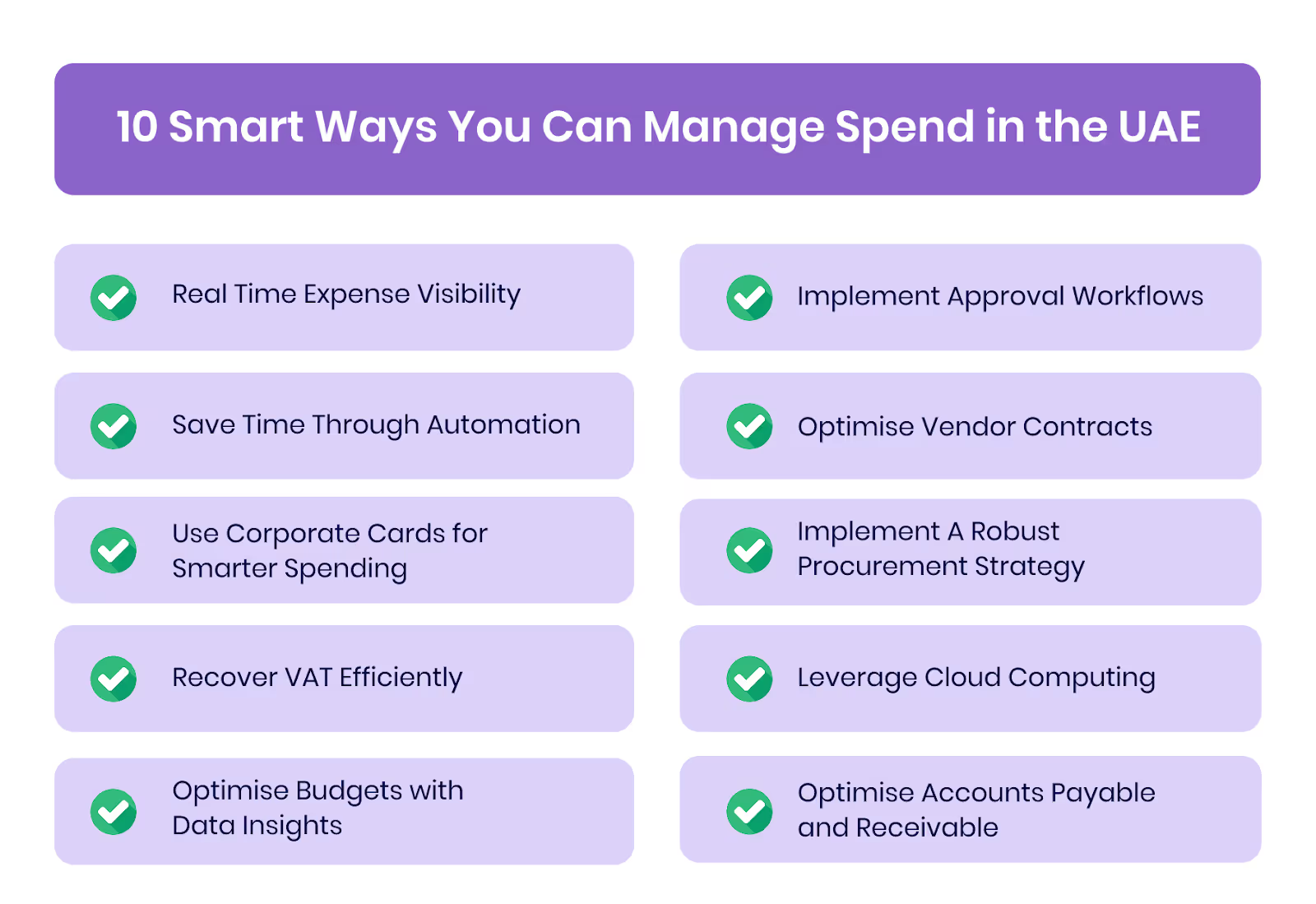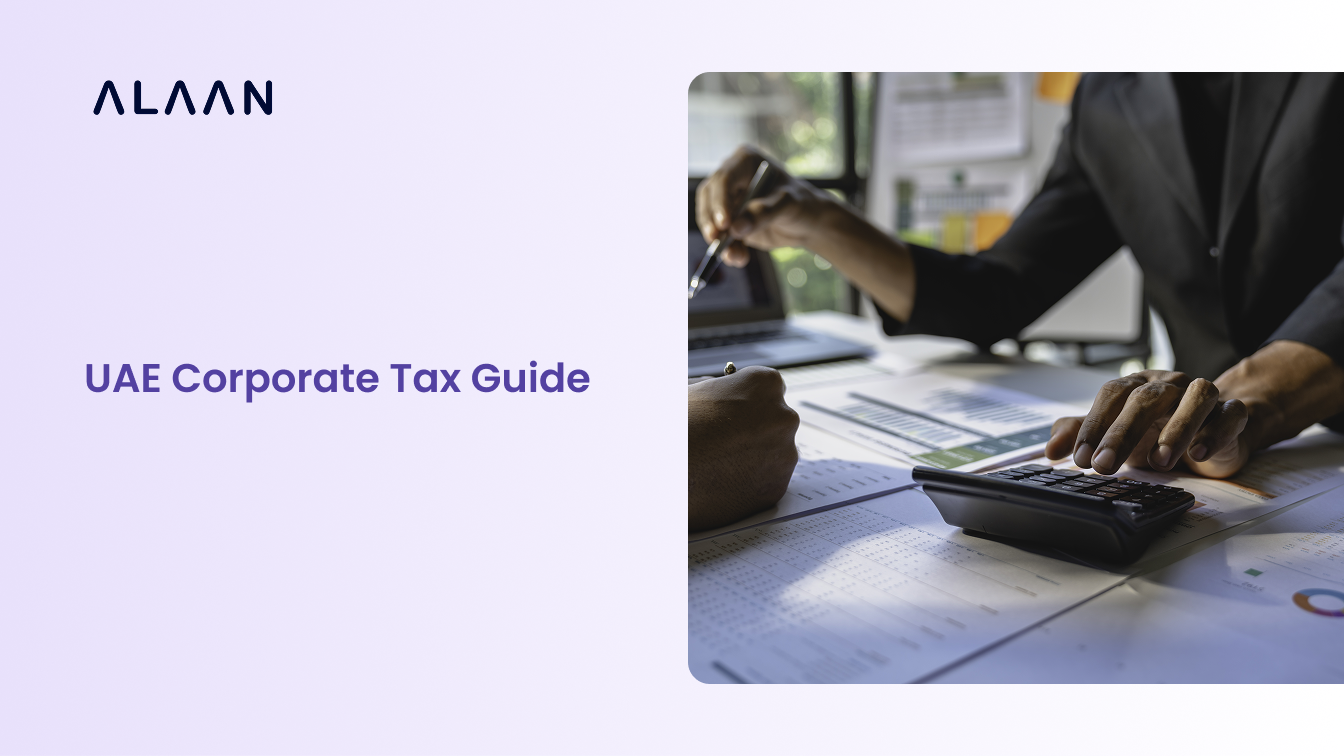Every dirham counts when operating costs keep rising faster than revenue. In a recent PwC survey, around 59% of CFOs said their top priority this year is reducing costs. The pressure is clear, companies want to save, but not at the expense of progress.
The smartest businesses are finding that sustainable savings come from visibility and control, not cost cuts. With real-time expense tracking, automation, and data-led decisions, finance teams are uncovering hidden inefficiencies worth thousands every month.
This article explores practical ideas that leading companies use to reduce waste, recover value, and build a culture of smart spending.
Key Takeaways:
- Expense Visibility: Real-time spend tracking empowers proactive decisions and tighter budget control.
- Process Automation: Streamlining accounting tasks through automation frees teams for strategic financial planning.
- Data-Driven Budgeting: Leveraging analytics uncovers inefficiencies and optimises resource allocation.
- Vendor Optimisation: Regular contract reviews and performance analysis maximise value and reduce hidden costs.
Where Companies Lose Money

Even small inefficiencies in finance can cost companies thousands each month. Identifying these leak points is the first step toward effective cost control.
Key areas of financial leakage:
- Expense Approval Delays: Slow or multi-layered approvals create bottlenecks and increase the risk of errors slipping through.
- Inaccurate Record Keeping: Missing receipts, mismatched transactions, and incomplete data can lead to lost VAT claims and audit complications.
- Uncontrolled Team Spending: Without limits or oversight, departmental expenses can exceed budgets without anyone noticing.
- Redundant Vendor Costs: Unused subscriptions or outdated contracts drain resources silently over time.
- Manual Reconciliation Workloads: Repetitive reconciliation tasks take time from strategic financial planning and increase the chance of mistakes.
Studies show finance teams spend almost 40% of their time on these manual tasks. Addressing these inefficiencies with targeted strategies not only prevents losses but also frees teams to focus on high-value, growth-oriented work.
10 Smart Ways You Can Manage Spend in the UAE

Finance teams in the UAE often face hidden inefficiencies that quietly drain budgets. These 10 strategies focus on practical ways to save your company money in the UAE, helping teams make smarter, data-driven financial decisions.
1. Real Time Expense Visibility
Real-time visibility transforms how finance teams manage company spending. Seeing transactions as they happen allows teams to act quickly, prevent overspend, and maintain accurate records.
Strategic benefits:
- Complete Expense Overview: All team and vendor transactions are tracked in one platform for immediate clarity.
- Early Identification of Issues: Missing receipts or incorrect entries are flagged as they occur, reducing month-end reconciliation time.
- Improved Budget Management: Spending patterns become visible, making it easier to adjust allocations and control costs.
- Data Insights for Decision Making: Analytics provide actionable insights for optimising vendors, contracts, and operational spending.
Companies that prioritise real-time visibility report more efficient workflows, fewer errors, and measurable reductions in unnecessary expenditure.
2. Save Time Through Automation
Manual expense processes take time and introduce errors, reducing overall efficiency. Automating routine tasks allows finance teams to focus on strategic priorities while ensuring accuracy and compliance.
Key benefits of automation:
- Instant Expense Capture: Transactions are recorded immediately, reducing manual entry and lost receipts.
- AI-Powered Verification: Receipts are automatically matched with transaction data, flagging discrepancies without manual effort.
- Custom Approval Workflows: Expense approvals follow company policies automatically, ensuring faster processing and fewer delays.
- Seamless Accounting Integration: Data syncs in real time with accounting software, eliminating repetitive bookkeeping tasks and easing month-end closings.
Companies adopting automated expense systems report a 75% reduction in processing time per report, allowing finance teams to focus on high-value activities.
Also Read: Why Choose Paperless Expense Management Automation
3. Use Corporate Cards for Smarter Spending
Corporate cards provide businesses with greater control, visibility, and efficiency in managing expenses. Leveraging these tools helps companies streamline spending and capture tangible financial benefits.
Strategic benefits:
- Customizable Spending Limits: Individual card limits can be set to match departmental budgets, ensuring spending remains within defined boundaries.
- Real-Time Expense Tracking: Transactions are visible as they happen, offering immediate insights into spend patterns and enabling timely adjustments.
- Streamlined Reconciliation: Integrating card transactions directly with accounting systems reduces manual entry and minimizes errors.
- Cashback Incentives: Eligible spending earns cashback, directly adding to the company’s bottom line.
Real World Example:
With Alaan, DIY Advertising streamlined its ad spending and saved thousands of dirhams in cashback. The finance team gained real-time visibility into all transactions, making it easier to detect anomalies and stay within budgets. This approach also reduced operational friction, enabling faster scaling and efficient management of high-volume transactions.
4. Recover VAT Efficiently
Unclaimed or incorrectly recorded VAT can quietly erode company profits. A structured approach to VAT recovery ensures compliance and maximises financial returns.
Strategic benefits:
- Automated VAT Capture: Extract VAT details from receipts and transactions to reduce manual errors and maintain accurate records.
- Real-Time Compliance Checks: Flag transactions with missing or incorrect VAT details immediately to address issues before month-end.
- Simplified Claim Process: Digitise and link receipts to corresponding transactions, making VAT claims faster and more reliable while minimising the risk of penalties.
- Maximised Recoveries: Track all eligible VAT to ensure no claims are missed, helping the company reclaim every possible amount.
Recovering VAT efficiently protects profits and ensures compliance, turning a traditionally time-consuming task into a strategic opportunity for savings and financial control.
5. Optimise Budgets with Data Insights
Budgeting is more effective when accurate, timely data back decisions. Leveraging financial insights allows organisations to allocate resources efficiently, identify overspending, and prioritise high-impact investments.
Strategic benefits:
- Identify Spending Patterns: Analyse past and current transactions to pinpoint areas of overspend or underutilisation.
- Forecast with Accuracy: Use historical data to project future expenses, helping teams plan budgets that reflect real-world needs.
- Inform Decision-Making: Data-driven insights support strategic choices on vendor contracts, project investments, and departmental allocations.
- Continuous Optimisation: Monitor trends regularly to adjust budgets dynamically, ensuring resources are allocated where they deliver the most value.
Organisations that integrate data insights into budgeting processes consistently improve financial efficiency, reduce waste, and make more informed strategic decisions.
[cta-1]
6. Implement Approval Workflows
Structured approval workflows ensure that expenses are reviewed and authorised according to company policy, reducing errors and improving accountability.
Strategic benefits:
- Consistent Compliance: All expenses pass through defined approval channels, ensuring adherence to internal policies and regulatory requirements.
- Faster Approvals: Automated routing speeds up decision-making, preventing bottlenecks and delays in processing payments.
- Clear Accountability: Each expense is traceable to the approving manager, promoting responsible spending across teams.
- Customisable Rules: Approval chains can be tailored based on role, amount, or project, ensuring that high-value or sensitive transactions receive the appropriate oversight.
Companies that implement structured approval workflows experience fewer errors, better budget control, and more efficient expense management overall.
Also Read: Steps to Automate Expense Management and Approvals
7. Optimise Vendor Contracts
Careful management of vendor relationships can directly impact costs and operational efficiency. Reviewing contracts regularly and leveraging data insights ensures companies get the best value from their partnerships.
Strategic benefits:
- Negotiate Better Terms: Analyse historical spend to identify negotiation opportunities, such as volume discounts or extended payment terms.
- Reduce Redundant Costs: Identify overlapping services or unnecessary fees to eliminate wasteful spending.
- Performance-Based Optimisation: Track vendor performance and align contracts with service quality and delivery metrics.
- Strengthen Strategic Partnerships: Transparent data on spend and performance fosters more productive discussions with suppliers, leading to mutually beneficial agreements.
Optimising vendor contracts enables companies to control costs more effectively, improve service quality, and redirect savings to high-priority initiatives.
8. Implement A Robust Procurement Strategy
Optimising procurement reduces costs, increases efficiency, and strengthens supplier relationships.
Key benefits:
- Vendor Consolidation: Partnering with fewer suppliers increases negotiating power, reduces administrative overhead, and can lower procurement costs by up to 15%.
- Bulk and Long-Term Contracts: Secure volume discounts and predictable pricing to minimise fluctuations and improve budget planning.
- Regular Spend Analysis: Monitor and analyse procurement data to identify waste, optimise sourcing, and prevent overspending.
A structured procurement strategy ensures cost control, predictable budgets, and stronger vendor partnerships that support scalable growth.
9. Leverage Cloud Computing
Cloud solutions provide flexible, scalable IT resources that lower costs and improve operational agility.
Key benefits:
- Lower Infrastructure Costs: Reduces reliance on on-premise hardware, cutting IT expenses by 20–30% and eliminating maintenance overhead.
- Enhanced Collaboration: Teams can access data and systems anywhere, improving productivity and speeding up decision-making.
- Scalable IT Resources: Adjust capacity instantly to match demand, avoiding overprovisioning and unnecessary spending.
Cloud adoption reduces operational costs, improves efficiency, and enables faster, more agile growth.
10. Optimise Accounts Payable and Receivable
Streamlining AP and AR processes can significantly enhance cash flow, reduce errors, and improve financial efficiency.
Key benefits:
- Prioritised Payments: Companies can identify high-impact invoices and schedule payments to maximise early payment discounts and maintain supplier goodwill.
- Automated Matching and Validation: Linking invoices to purchase orders and receipts automatically reduces errors and prevents duplicate payments.
- Shortened Collection Cycles: Organised receivable management ensures faster client payments, improving liquidity and reducing the need for short-term borrowing.
Optimising AP and AR processes not only reduces operational costs but also provides finance teams with better control over cash flow and financial planning.
Also Read: What are Accounts Payable and Accounts Receivable?
Streamline Corporate Spending with Alaan
Alaan helps companies take full control of corporate expenses, combining visibility, automation, and actionable insights in one platform.
Key Offerings and Strategic Benefits:
- Corporate Cards with Precision Controls: Issue unlimited cards with custom limits and merchant restrictions to ensure every payment aligns with budgets and policies. Contactless payments via Apple Pay and Google Pay make travel and business payments seamless.
- Automated Expense Management: Transactions are captured in real time, receipts digitised, and approvals routed automatically, cutting hours of manual work and reducing errors.
- Accounting Integration and Compliance: Sync expense data directly with accounting systems for accurate bookkeeping, simplified reconciliation, and VAT compliance.
- AI-Powered Insights for Budget Optimisation: Analyse spending trends, detect anomalies, and make informed decisions to optimise budgets and improve financial efficiency.
- Cashback and Transparent Savings: Earn unlimited 2% cashback on eligible transactions while benefiting from simple, clear pricing and zero cost for most businesses.
- Full Visibility Across Teams: Monitor expenses across departments and projects in real time, giving finance leaders complete oversight and control.
Join over 1,500 businesses already simplifying finance with Alaan. Learn more, connect with peers, and access actionable insights through our CFO Community.
Conclusion
Effective expense management goes beyond tracking receipts. By combining corporate cards, clear approval workflows, VAT recovery, and data-driven budgeting, finance teams gain control, reduce errors, and uncover cost-saving opportunities.
Implementing these strategies frees up time for strategic priorities while ensuring spending aligns with company goals and compliance requirements.
[cta-4]
FAQs
1. What innovative ideas can I use to save my company money?
Companies can adopt technology-driven solutions, optimise supplier contracts, and monitor discretionary spending to reduce costs without affecting productivity.
2. How can I identify hidden areas where my company is overspending?
Analysing departmental budgets, reviewing recurring subscriptions, and auditing operational processes can reveal inefficiencies and hidden expenses.
3. Are there creative ways to reduce overhead costs in my business?
Businesses can implement flexible work arrangements, renegotiate lease or utility contracts, and streamline office operations to lower overhead expenses.
4. How can small changes in operational processes save money?
Optimising workflows, reducing manual paperwork, and consolidating approvals can cut administrative costs and save time, translating into financial savings.
5. What strategic approaches help my company save money long-term?
Long-term savings come from investing in automation, centralising financial controls, and negotiating supplier agreements to secure predictable and reduced costs.


.avif)







%201.avif)